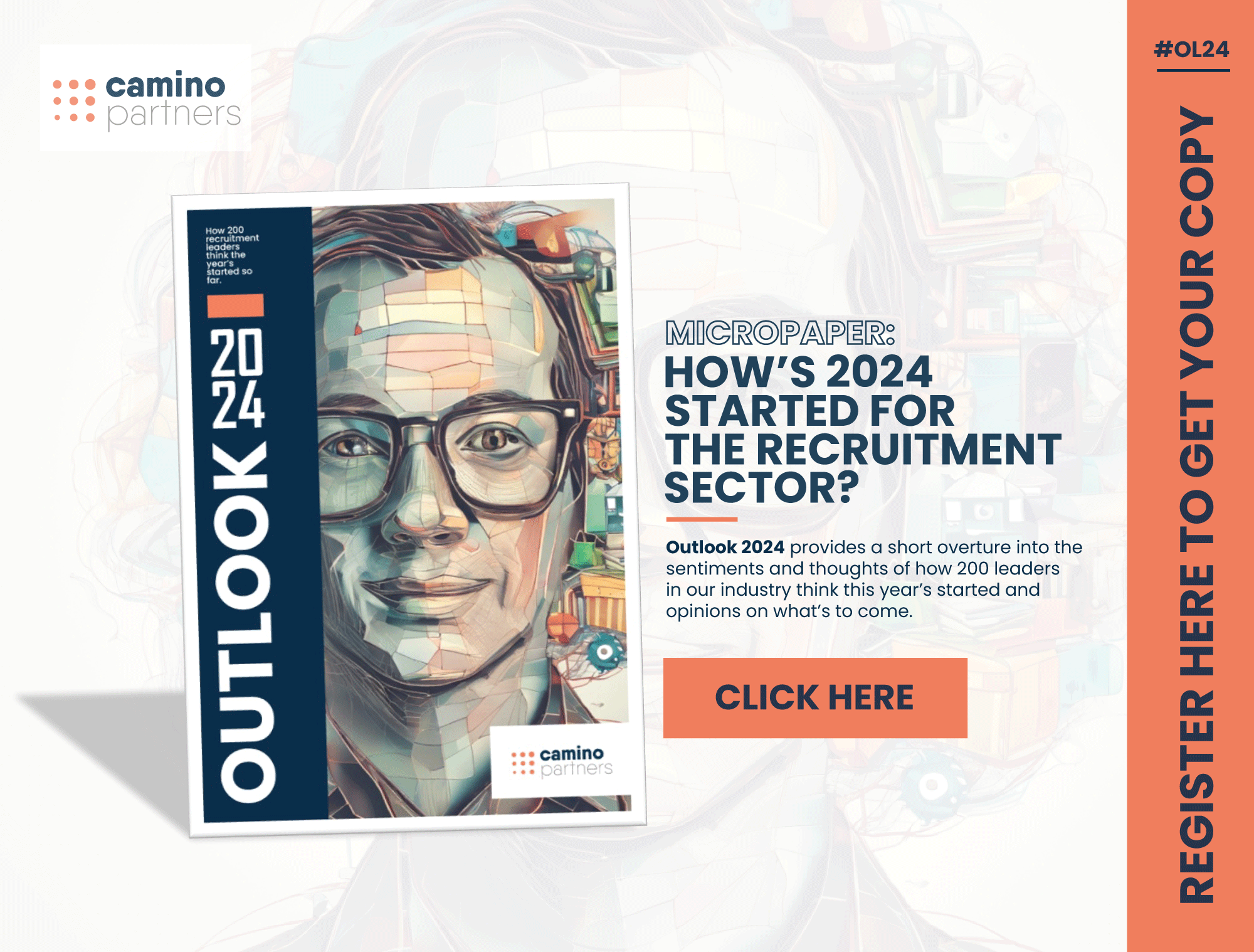
The pathway to CFO: Three recruitment CFOs share their thoughts on ‘stepping up’ into the number one position in accountancy.
Earlier in March Camino Partners invited 25 financial controllers (FCs) from a variety of different recruitment sectors to attend our ‘Pathway to CFO” workshop, held in conjunction with Saffery accountants at the company’s London offices.
Four CFOs; Seim Munif - Gravitas Recruitment Group, Bala Shanmugam - Majar Group, Rebecca Horne – Leathwaite and Sue Lewis – Petroplan, conducted roundtable mentor sessions with the FCs, to provide tips and answer questions around stepping up into the ‘number one’ seat in accountancy.
Following the workshop, we asked our financial controllers to position a series of key questions to our CFOs, conducted in a Q and A style interview with Camino Partners’ Managing Director, Matt Newman (MN).
Responding in the interview, below, were Bala Shanmugam (BS), CFO, Majar Group, Rebecca Horne, (RH) Leathwaite, Seim Munif (SM), Chief Financial Officer at Gravitas Recruitment Group.
Matt Newman (MN) What do you think are the key differences between a Finance Director and a CFO?
Seim Munif (SM) A CFO role versus an FD role can sometimes just be semantics. A “CFO” is more of an American term but has become the norm in the UK. As the Chief Finance Officer, you should really have other directors reporting into you too.
In my experience, FDs are often a very safe pair of hands, excellent at stewardship and operational processes, accurate in what they do and confident in their delivery. A CFO will be expected to be a catalyst for change in an organisation, willing to speak truth to power and provide a different point of view. They are a business partner to the CEO and key stakeholders providing insight, identifying risks and mitigations. They are expected to add value in strategic projects across the organisation ranging from finance, systems, legal & operations to leading M&A and office openings.
The step up from an FD to a CFO can often be about elevating yourself from your current position through focus, prioritisation, stakeholder management and, importantly, effective delegation and empowerment.
The Pathway to CFO event earlier in March was a great success for finance leaders seeking to step-up into the number one position in the accountancy department. The event was held in conjunction with Saffery, at their London office.
--
(MN)From your own experience, what three key learning points should future finance leaders keep in mind when stepping up to become a CFO?
(SM) Don’t become the CFNo. There are so many more collaborative ways to disagree on a matter than saying “No”. Indeed, it is often better to agree with the positives from what is proposed and then overlaying with – “have you also considered the following”
Empowerment is fundamental to success. Provide a vision and clear goals, provide the “why” for the work that is being requested and cultivate a culture of transparency where people are open about their mistakes.
Relationships, attitude and networks can become more important than your own skills and knowledge.
(MN)What do you notice as some of the key differences between performing a 'controllership'-type position in the finance function and a senior leadership position in the finance environment?
Bala Shanmugam (BS) A senior leadership position such as a CFO has a broader scope that goes beyond stewardship of the reporting numbers and management of the balance sheet to include responsibility for things such as;
-
strategic financial planning - such as fund raising, forecasting methodologies, developing and maintaining banking/finance partner relationships and so on
-
commercial analysis - to help identify actions that improve the effectiveness and efficiency of the business
-
developing financial/commercial policies to ensure clear positive management of the business
-
partnering with senior stakeholders and working on cross functional initiatives that require leadership and collaboration in equal measure
-
decision making becomes a critical skill and involves taking consistent, considered and evaluated decisions in what is on many occasions a ‘grey’ area that will affect the entire business
-
strategic input to guide the long term success of the business - usually as part of a Board.
-
investor management - maintaining strong relationships and credibility with key investors to ensure they have the information to be sufficiently updated on the state of play and understand with sufficient visibility any challenges the business might face or investment the business may require to meet its objectives.
-
(MN) What leadership lessons have you learnt since stepping up to your CFO position and what advice would you give more ‘junior’ team members who aspire to becoming a C-Suite leader, to develop their finance leadership skills?
(BS) I’ve probably learned more lessons from making mistakes than I have from getting it right the first time - but some of the key pieces of advice I would give are;
-
Ensure you build strong relationships at all levels of the business so that you have a thorough understanding of the challenges faced from the ground up - as in my experience - this leads to more practical and effective solutions that will have impact.
-
Don't be afraid to make decisions - take responsibility and back your decisions, you would have evaluated the situation as thoroughly as possible and can showcase your leadership skills by explaining your decision making process and taking responsibility for the outcomes.
-
Ensure Finance are a value added team not just a cost centre - your team are critical to your and the businesses success - ensure you invest significant time into developing and guiding the team, giving them a bigger picture understanding, giving them earned responsibility as early as possible, encouraging business partnering with appropriate counterparts and allowing them to make mistakes along the journey. Involve your team in your decision making process wherever possible.
-
Plan head - look as far into the future as you can with any reasonable level of certainty and plan for eventualities - many actions take time to be implemented - as a leader you need to be able to ensure these actions impact when they are needed not when they are too late. This requires, strategic thought, clear forecasting abilities, scenario planning, networking and influence skills.
-
Embrace change - ensure you cultivate an environment where change is the norm rather than the exception. From continual incremental improvements to step changes such as technology implementations - a business that can be ahead of the curve or as a minimum quickly adapt to changing environments will generally be more successful than reactive businesses.
-
Data is king - every recruitment business gathers a significant amount of data - I have found that utilising your data effectively and creating a data culture within the business leads to better strategic decisions, improved profitability and the ability to make quicker decisions.
MN: How do you see the role of CFO changing in the recruitment sector in the next ten-to-20 years
Rebecca Horne (RH). I think the term ‘CFO’ can be used for so many different types of roles, CFO in a 20-person organisation will be different to a 20,000 person organisation, but overall the role should continue to develop in its consultative aspects and the ‘toil’ elements should continue to dissipate. My hope would be technology helps to support greater assurance around compliance (as above and before removing some of the toil). The one element I don’t believe will change is that all good finance roles (and more so a CFO) are about building relationships (whether that is tax managers with advisers or HMRC contacts or management accountants with their respective business leads they are business partnering) – the more we can continue to build relationships and trust in organisations to be able to share opinions supported by wide and varied data points that support effective and relevant decision making the greater the space we have at any table we are invited to. To me the role will continue to play a hugely important part in any organisation, continue to be hugely consultative, but able to rely on much more timely and varied information to feed opinion.
MN: What's the latest in finance automation and what are your thoughts around the future of AI?
RH: I don’t have a specific answer around the ‘what’ in relation to automation and AI, but across all organisations, and functions within organisations, we need to constantly be striving to remove ‘toil’ from within organisations. I believe that is where organisations will benefit most in the short to medium term. More efficient transactional activity delivered more accurately. That said I am more mindful of how this is deployed against ‘value add’ more ‘nuanced consultative activity’ so my personal belief is that the provision of good quality data, delivered in efficient timeframes in an easy to use format will continue to be transformative for the finance functions, but for me the more consultative elements being replaced by AI have a healthy level of scepticism about. I don’t think there is anything unique to the finance function or commercial organisations in the above, but it is the general tech enabled trends we are all dealing with day in day out.
Share Blog
Blogs related
- Recruitment Sector Salary Benchmarking Now Available
- Camino Partners Launches 'Recruitment Sector Temperature Check' Micropaper
- 2024 And The Finance Function
- Into 2025: The Recruitment Sector Salary Benchmarking
- When is the right time for a recruitment agency to invest in an in-house L&D team?
- The pathway to CFO: Three recruitment CFOs share their thoughts on ‘stepping up’ into the number one position in accountancy.
- Finding the right L&D approach for your recruitment company: In-House, External or Hybrid?
- HOW DO 200 RECRUITMENT LEADERS THINK 2024 STARTED FOR THE SECTOR?





